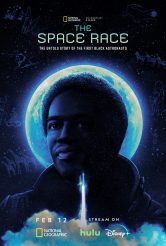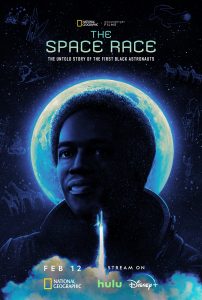THE SPACE RACE, National Geographic’s documentary about the history of Black astronauts in NASA, premieres Monday, February 12, and is available thereafter on Nat Geo and Disney+. The stories and interviews include now ninety-year-old Ed Dwight, who was on track to be the first Black American in space until the assassination of President John F. Kennedy interrupted his career. THE SPACE RACE also includes discussion of Arnaldo Tamayo Méndez, a Cuban cosmonaut who became the first Black man in space in 1980 on the U.S.S.R. Soyuz mission.
Frank Marshall, the producer who won the Academy’s Irving G. Thalberg Award in 2019, has five Best Picture Oscar nominations (including one for RAIDERS OF THE LOST ARK), five Best Documentary Emmy nominations, and one Outstanding Made for Television Movie nomination, is the executive producer and one of the driving forces behind THE SPACE RACE. Dwight and a number of Black astronauts who did make it to space are interviewed in the documentary, which is directed and produced by Diego Hurtado de Mendoza and Lisa Cortés.
THE SPACE RACE began, Marshall explains, when he and Hurtado de Mendoza were in Cuba for an entirely different project.
“We were making a documentary about Cuban boxers in the Olympics, and why so many Cuban boxers achieve success at the Olympics. And one afternoon, [Hurtado de Mendoza] came and he said, ‘I had the most extraordinary dinner last night with, I think, the first Black astronaut.’ And I said, ‘What?’ And he said, ‘Yeah. And he’s Cuban.’ And I said, ‘Well, that’s another doc.’ And he said, ‘Yeah, he has all this footage, and there’s some footage here.’ And so, we started talking about our next doc together, and then I brought that story to [Executive Vice-President of Global Scripted Content and Documentary Films] Carolyn [Bernstein] at Nat Geo, and she says, ‘Great’ in the first five minutes. So, we started this journey – this is what I love about it – then, as we started asking questions, we found out that we had this program that nobody knew about, and nobody knew about Ed, and they didn’t know about each other, and so it made this left turn, right in the middle of our discovery process.”
Marshall says he was, sadly, not surprised by Dwight’s account of how racism had hindered his NASA trajectory prior to President Kennedy’s intervention, and completely devastated it after Kennedy’s death. “Because I grew up in that era, in the ‘60s. I love space, and I was one of the directors on [the HBO docudrama] FROM THE EARTH TO THE MOON, and I don’t remember any Black astronauts in it. So, I wondered, ‘What happened?’ And then of course, we all remember where we were on the day that President Kennedy was assassinated. And it makes total sense that [Kennedy] was pushing [to have Black people included in the astronaut program], and then when he was gone, boom.
President Kennedy’s assassination was a setback for civil rights nationally, in all fields. “So many things were changed. And when we started talking to Ed, it was unbelievable, because he’s so open and so honest, and you can imagine him being the first. Just imagine what would have happened if he had gone to the moon.”
For those who were children or not even born when STAR TREK and the original PLANET OF THE APES had Black astronauts, and knew science fiction before science fact, it came as news that the actual space program of the time was not integrated.
Marshall points out, “We tell the story in there that [STAR TREK‘s] Nichelle Nichols was big [both as a symbol and as a NASA ambassador], and kids look up to what they see. And the fact that that inspired a whole lot of other [people]. We were all inspired by going into space. So, when I talk to [astronaut] Victor [Glover] and he says, ‘Yeah, I’m going up to the space station,’ what’s that like? It’s so cool to hear these other stories.”
Now that Marshall and THE SPACE RACE have brought the astronauts together as a group, what do they like to talk about amongst themselves? He laughs. “Movies.”
Does Marshall think the audience for THE SPACE RACE is people who already care about social issues, or does he think it may inspire reflection among viewers who are excited about space, but aren’t particularly concerned about social issues?
“I hope it opens up minds. I hope that it shows that it’s possible for any human to go into space, and that we all should share that possibility. So, I do hope that this story opens some minds, and is able to have people appreciate what humankind can do.”
This interview was conducted during National Geographic’s portion of the winter 2024 Television Critics Association press tour at Pasadena, CA’s Langham Hotel.
Follow us on Twitter at ASSIGNMENT X
Like us on Facebook at ASSIGNMENT X
Article Source: Assignment X
Article: Exclusive Interview: Executive producer Frank Marshall talks about the National Geographic film THE SPACE RACE
Related Posts:












